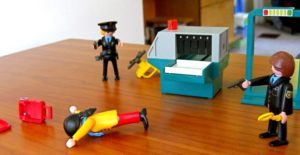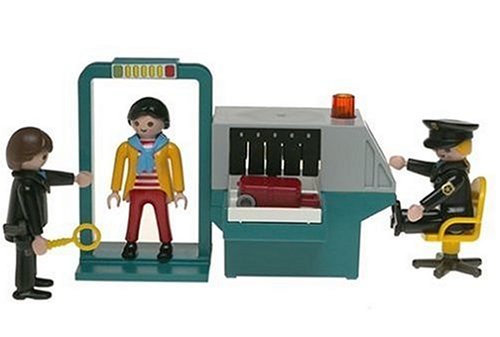Flying in the brave new age reminds me of a phenomenon that, earlier this week, I tried to partly capture in a tweet from the Portland (Maine) International Jetport (which is not the worse airport in America):
He who cannot explain why intrusive security still mars air travel NINETEEN years after 9/11 and decades after highjackings to Cuba does not understand the world.
Imagine the reaction of the honest supporters of the 2001 PATRIOT Act if they could have peeked at a TSA line two decades in the future: Americans showing their ID cards, removing their shoes and their belts, preparing their luggage for search, obediently following orders, putting their hands up in the scanner and, perhaps the worst, having come to think (at least for many of them) that the checkpoint society is totally normal.
There was even a Playmobil Security Check Point toy. The New York Times (“Playmobil Plays Fun in the Police State,” February 15, 2009) reported about an anonymous comment on an Amazon review of the product:
The set—which includes armed airport security officers, a metal detector and an X-ray screening machine—has drawn nearly 50 biting customer reviews, and scores of comments to those reviews, on Amazon.com.
“I applaud Playmobil for attempting to provide us with the tools we need to teach our children to unquestioningly obey the commands of the State Security Apparatus,” wrote one Amazon reviewer pseudonymously. “But unfortunately, this product falls short of doing that. There’s no brown figure for little Josh to profile, taser, and detain?”
It’s not clear if the scene reproduced below was built from the unadulterated toy (source: https://odditymall.com/tsa-airport-checkpoint-toy), but it looks like it. The manufacturer discontinued the product after six years, denying it was because of consumer complaints. Perhaps, after all, the Playmobil toy served as a good pedagogical moment.

There are many overlapping explanations of why this security apparatus is still in place. None requires a conspiracy theory, only the logic of state institutions—as economists use it in analyzing the political consequences of individual actions.
One explanation lies in the inefficiency of the state in protecting personal security. Air travel has been transformed in “travel to penal colony” as my friend George Jonas used to say. After 9/11, more intrusive “security” was imposed, officially to fight a few 7th-century fanatics living in caves. I agree that the problem is not simple in societies called free, where discriminatory controls and profiling are shunned for good reasons and where, therefore, it seems that everybody must be equally controlled and searched, from young children to old grandmothers. In a “free society” or in a totalitarian one, it seems, the state must oppress its subjects in order to protect them. (Does this criticism provide an argument for waging wars abroad instead of at home?)
A complementary explanation models the natural tendency of the state to turn into Leviathan. Thomas Hobbes even skipped the slippery slope and argued that a protective state is necessarily a Leviathan. Respectable schools of political philosophy and economics—Anthony de Jasay and Bertrand de Jouvenel come to mind—argue that the state naturally becomes Leviathan by using its clienteles’ demands as an excuse to increase its power until tyranny is finally unchallengeable or nearly so. Nine-eleven has been a great help to Leviathan.
At a more basic public-choice level, the development of the Security State creates constituencies that will render its retreat very difficult if not impossible. Just think of the jobs and privileges created in the security apparatus during the past few decades, from the ordinary policemen transformed into SWAT soldiers to the dignified border cops and the roughly 50,000 TSA employees. They won’t give up their turf easily.
Benjamin Franklin’s famous aphorism looks like a chiché:
They who can give up essential liberty to obtain a little temporary safety, deserve neither liberty nor safety.
It does however say something about the political economy of state security, but without capturing the collective-action problem of resisting to the growth of Leviathan.


READER COMMENTS
Dylan
Mar 23 2019 at 12:12pm
I hate to be pedantic, but I feel obliged to point out that we are a mere 17.5 years after 9/11, not quite to 19 yet.
I do agree with your main point, that I sadly can’t see a realistic pathway to deescalating the security theater of the TSA in anything like a near term horizon, whether it be 17 years, or 19 years, or 29 years after 9/11.
Pierre Lemieux
Mar 23 2019 at 7:49pm
Dylan: You are right. My arithmetic was a bit faulty.
Pierre Lemieux
Mar 24 2019 at 1:31am
And I just corrected it. Thanks again.
Benjamin Cole
Mar 23 2019 at 7:34pm
A couple decades after 9/11, the United States has spent $7 trillion on the MidEast, which President Donald Trump says was “wasted.”
It speaks volumes about the Washington globalist blob that it takes a Donald Trump to speak the truth— although some say Trump was speaking euphemistically, and the money spent in the Mideast was not merely wasted but counterproductive.
Using a mercenary US military as a global guard service for multinationals has become very expensive. And yes, the TSA is annoying also.
Thaomas
Mar 23 2019 at 7:37pm
I think a path away from screening is to turn the job over to airports. Let each one decide what sort of screening it wants. If some come up with less intrusive regimens with no ill consequences, that could spread.
Pierre Lemieux
Mar 29 2019 at 3:04pm
I would be better to let airlines take care of security, which would open a real possibility of competition to offer different groups of customers what they want–which should be the goal. Airlines or course could delegate some part of their responsibilities to the airports they use, to the extent that it is efficient. There is no simple solution, but giving carte blanche to Leviathan is the worst one.
robc
Mar 24 2019 at 3:51pm
I said at the time that the only thing the newly created TSA needed to do was put up a “Lets Roll” poster outside each skyway.
It would have been exactly as effective.
BC
Mar 24 2019 at 11:00pm
Another plausible explanation is that decision makers essentially sell puts on security. Suppose someone advocates, and therefore takes responsibility for, dismantling the security screening. If another attack happens, then that person will be blamed for loosening security. On the other hand, if no attack happens, that person will not necessarily be treated as a hero. At most, that person will continue in his job. There is no real incentive for that person to bear concentrated career and reputational risk from an attack instead of imposing dispersed costs of inconvenience on all travelers. If we want looser security, we need to find some way to incentivize decision makers such that they gain when travelers gain convenience and privacy from looser security and don’t lose too much if another attack were to happen. I’m not sure how to do that nor does the second part necessarily seem that wise if overdone. Maybe, we should measure and track passenger waiting times in security lines as a means of doing the first part.
I think a few years ago the TSA itself actually was going to resume allowing small Swiss Army knives in carry-on baggage, having determined that such small knives did not pose a significant security threat. Flight attendants unions and others vehemently objected, so the proposed change was dropped. There is almost no upside for someone to stick their neck out advocating looser security in the face of opposition.
Pierre Lemieux
Mar 29 2019 at 3:09pm
This is a good argument, which applies to many other bureaus (such as the FDA). It is an argument for not allowing government bureaucracies to impose unique solutions to everybody.
Mark Bahner
Mar 25 2019 at 12:28pm
Not directly relevant to the article, but the article gets me to thinking about taking off shoes. Surely, if security was privately run, there would be some piece of equipment designed to look for bombs in shoes without having to take the shoes off. I’m too lazy to try to calculate it exactly, but multiply all the billions of passengers that have flown over the years times the seconds to minutes required for each to take off and put on shoes. What a waste!
Dave E
Mar 26 2019 at 1:05am
9/11 completely shifted the airline security mentality instantaneously. Flight deck doors were secured and we all figured out in a flash that hijackers had to be taken down whatever the cost. That’s about 90 percent of the gain. But that doesn’t protect against bombers. It also created a new risk of a pilot locking themself in the flight deck crashing the airplane.
I don’t love the TSA. Every time I clear security I think to myself “welcome to the land of the brave and the home of the free.” But I don’t have a better answer.
Steve B
Mar 27 2019 at 9:35am
What if we turned physical security back over to the airports. Every airport is unique in terms of passenger loads and physical layout, the airports are best positioned to own this problem.
Descope TSA, loose 90% of the personnel and redefine their role into two activities:
1) Dissemination of threat intelligence to the transportation community
2) Testing security systems through continuous UNNANOUNCED attempts to break security systems and sneak contraband into secure areas, with severe penalties for the security operator should they succeed.
The testing is to counter the natural tendency of security system operators to reduce expenditures and fight the complacency that will grow over time.
Pierre Lemieux
Mar 29 2019 at 3:10pm
About your first point, see Thaomas and my reply above.
D. J. Muse
Mar 27 2019 at 10:40am
For many, including me, I believe it’s a constant reminder that we have “lost.”
Our nations’ enemies forced a change on us, a change that deprived us of some of our liberty. Until we eliminate the TSA foolishness, our nation is surely on the losing end of the “war against terror.” After all, what is the purpose of “acts of terror” if not to control the target and their behavior?
If we are to “win,” we must reject the boot that holds us down in my opinion.
Pierre Lemieux
Mar 29 2019 at 3:00pm
It is tantamount to advancing national tyranny in order to reduce the threat of foreign tyranny.
Comments are closed.